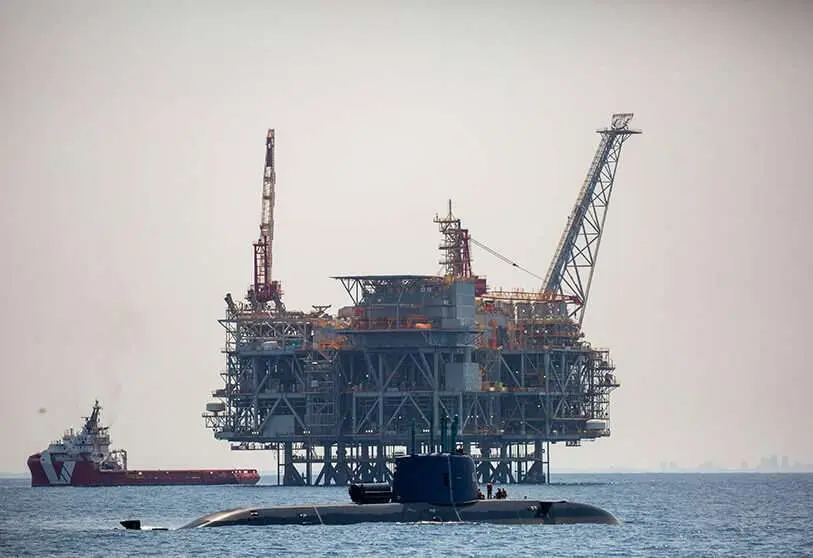Palestinian Authority hopes to extract gas from the Mediterranean with Egypt's support

Following the historic maritime agreement between Israel and Lebanon that allows both countries to benefit from rich gas fields in the Mediterranean, the Palestinian Authority hopes to extract natural gas from the waters off Gaza with Egyptian backing. Palestinian Prime Minister Mohammad Shtayyed announced that the head of the Palestinian Investment Fund (PIF), Mohammad Mostafa, is negotiating a gas extraction deal with the Egyptian Natural Gas Company (EGAS). Shtayyed will also form a committee of several ministers to follow up on the Palestinian gas issue.
According to a Palestinian source quoted by The New Arab, the Palestinian Authority, led by Al-Fatah, and the Egyptian company will sign the agreement "before the end of this year". The agreement will define the distribution of shares to the partners and how the gas will be marketed.

"We want an agreement that serves our national rights and capabilities, and benefits our people," Shtayyed said, according to Arab News. "The gas extraction project is an important strategic issue for us," a Palestinian government official told the Saudi media. The source also stressed that gas extraction would generate revenues that would help "the government's treasury".
For this reason, the Palestinian Authority has for years shown interest in exploiting the natural gas field off the Gaza Strip, controlled since 2007 by its political rival Hamas, with whom it recently signed a reconciliation agreement in Algeria. "From a legal point of view, Hamas has nothing to do with the gas in Gaza, but given that it controls the enclave, it could easily hinder the agreement," Mazen al-Ajla, a professor of economics at the Islamic University of Gaza, told AFP.

The government of Mahmoud Abbas will have to reach an agreement with the Islamist group, as well as with Israel, to start extracting gas from the Gaza Marine field. "Israeli approval is necessary," a Palestinian Authority official told the news agency. Ramallah hopes that Egypt can persuade Israel to allow the project and that the US will mediate between the two sides as it did in the maritime agreement with Lebanon.
However, Israel could hinder the project if Hamas benefits in any way from the natural gas, as Al-Ajla points out. According to the professor, the Israeli authorities will make it a condition that the Islamist group does not benefit from the project. In this sense, the role that Egypt can play as a mediator between the two parties is once again highlighted. "Egypt can solve this problem by putting pressure on Hamas", he adds.

Tarek el-Mulla, Egypt's Minister of Petroleum and Mineral Resources, expressed his support for "the right of Palestine to benefit from its own resources". El-Mulla has also conveyed to Mohammad Mostafa, head of the PFI, that Cairo "will spare no effort" to help the Palestinian economy in this regard, according to local media reports.
So far, Egypt is the only country to have signed a memorandum of understanding with the Palestinian authorities to exploit gas fields in the area, 36 kilometres from the Palestinian enclave. Gaza Marine, discovered in the 1990s, contains more than 1 trillion cubic feet of untapped natural gas.

As Arab News underlines, based on estimates by Samir Hulileh, a Palestinian economist, annual revenues from the field could amount to $700-800 million per year. Part of these funds could be allocated to Gaza's power plant and alleviate the constant power cuts in the territory. The gas revenues could also boost the ailing Palestinian economy.

On the other hand, analysts warn Al-Arab that the project could provoke border disputes between Egypt and regional countries, particularly Turkey. Cairo and Ankara have already had disagreements over Libya. Egypt's Foreign Ministry - along with that of Greece - considered a memorandum of understanding recently signed by the Libyan government of Abdul Hamid Dbeibé and Turkey on hydrocarbon exploration in Libyan waters to be 'illegal'.
The head of Egyptian diplomacy recalled that the mandate of the current Libyan government has expired, so "it has no legitimacy to sign agreements". Unlike Turkey, during the Libyan conflict Egypt has backed Libyan Marshal Khalifa Haftar, head of the Libyan National Army (LNA), against the Government of National Accord (GNA) and later the Government of National Unity (GNU).








